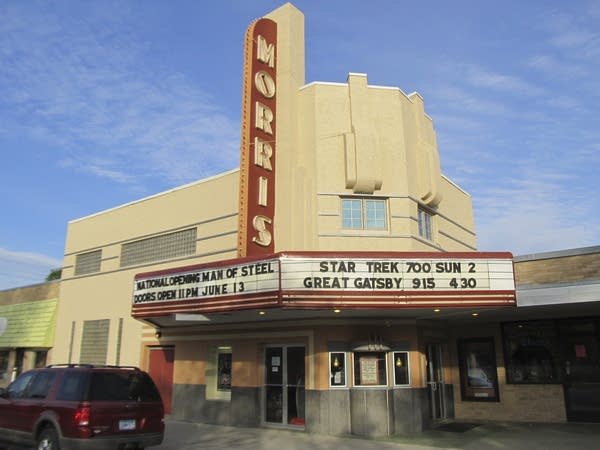Morris theater-goers band together to save local cinema

Screens have gone dark at hundreds of Minnesota's small-town theaters over time, and for a while it looked as though the Morris Theatre, an iconic 1930s landmark, complete with an art deco-style neon marquee, was going to close down a few years ago, too.
But movie buffs and regular residents in this western Minnesota city came together to keep the doors open.
Dave Aronson is one of the leaders of the labor of love — and expense. He and some like-minded supporters gulped at the asking price of $115,000, but scraped the cash together with contributions and bank loans: $10,000 from individuals for the earnest money and then two loans of $55,000 each to cover the rest.
Create a More Connected Minnesota
MPR News is your trusted resource for the news you need. With your support, MPR News brings accessible, courageous journalism and authentic conversation to everyone - free of paywalls and barriers. Your gift makes a difference.
Then they buckled down for some serious detective work, intent on tracking down period-accurate fixtures and decorations.
They needed a shiny, glass-like product called Vitrolite that's no longer made, but was essential to repair the theater's art deco exterior, and found it with a collector in St. Louis.
There was the mystery of where to find distinctive glass blocks for the windows. "I think it was on Craigslist they found a young farm couple in Iowa who was tearing down a milk house and had 20 blocks," Aronson says.
The retired University of Minnesota-Morris administrator says the theater's innards were not exactly spic and span, either: "We scrubbed the floor, we washed the seats, washed down the walls."
NEW LIFE IN OLD MODEL
To keep the doors open, they adopted a decades-old business model already familiar to folks in farm country looking to sustain creameries, telephone networks and electric service: They formed a co-operative. The theater is registered as a Minnesota co-op, which means that only people with a Minnesota residence are eligible to become members. There's no limit on the number of shares a member can buy, but the member still gets only one vote.
The annual operating budget is about $80,000. A share costs $250 and there are 251 members of the co-op. Members get a 10 percent discount most evenings at the concession stand, and after paying for admission to 10 movies, members are admitted free to the 11th. A ticket costs $6.50 and a big bag of popcorn with a soft drink goes for $5.
The ticket price is lower than the national average, which industry analysts say is just under $8. Most of that money goes back to the movie distributor and studio — movie theater owners make most of their money from concession sales.

So far, Aronson says, the co-op has not paid a dividend to members. But that's not really the point, says Morris Mayor Sheldon Giese. He brings an accountant's sensibilities to the analysis: A hometown movie screen helps other businesses by keeping locals in town.
"They might stop at the grocery store, gas stations, restaurants," he says.
And he's happy to help that dynamic. Along with his day job as a CPA, Mayor Giese is president of the theater board. His family volunteers every Monday to sell tickets, popcorn and start the film.
First-run movies, shown with a new, digital projector, are the Morris Theatre's financial meat and potatoes. Still, on a big night, about 200 people buy tickets in a building that seats up to 450. Many nights fewer than 100 people are in the audience. The co-op is still paying off a loan to install the digital projection system, and Giese says the next big project is putting in a second screen at a cost of at least $250,000.
That kind of expense reflects the need to compete in a tough market. The National Association of Theater Owners says there are 155 movie houses or complexes in Minnesota — a decline from recent years and a number that is expected to drop further as owners of older movie theaters decline to convert to digital projection. However, the number of movie screens within multiplexes has increased to 883.
Members also open the theater to community events. An environmental group used it recently to screen a documentary about Aldo Leopold. There's an annual film festival aimed at area's growing Spanish-speaking population.
New co-op member Chris Jerke says it all helps keep the town alive.
"It benefits all of us to have it here," she says. "It's worth the effort and worth the cost."


